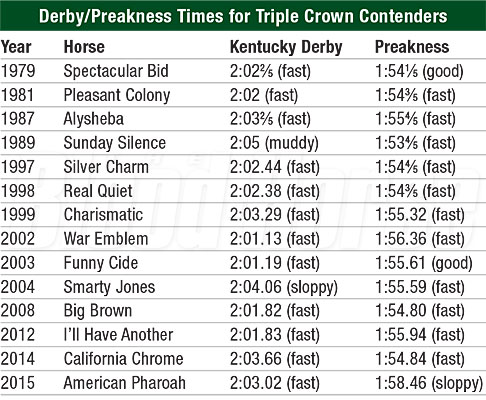Much of the discussion following American Pharoah’s romp in the Xpressbet.com Preakness Stakes (gr. I) turned quickly from whether he could win the Triple Crown to whether he would be a deserving Triple Crown champion.
A modest final time in the Kentucky Derby Presented by Yum! Brands (gr. I) and a sluggish time on a sloppy Pimlico surface in the Preakness drove a lot of speculation regarding this remarkable horse’s place in racing history. We’ve wheeled the cart about a quarter-mile down the road in front of the horse.
After the Kentucky Derby, American Pharoah’s first real test, the final time and margin became points of debate because he only beat Firing Line by a length in 2:03.02. The time was just a couple of ticks faster than California Chrome’s final time of 2:03.66 last year. Eight of the 13 horses who had a shot at sweeping the Triple Crown since Spectacular Bid in 1979 won the Derby in under 2:03 and five won it in 2:02 or faster.
Now the Preakness. On a track turned to slop by a pre-race thunderstorm, American Pharoah won by seven lengths in a relatively pedestrian 1:58.46. The final time was the slowest Preakness since 1956, when Fabius beat Kentucky Derby winner Needles in 1:582⁄5. Watching longshot Tale of Verve, who broke his maiden April 23, finish second in the Preakness only revved up the skepticism about American Pharoah’s performance.

Clearly the slop didn’t hurt American Pharoah, who had won the Rebel Stakes (gr. II) by 61⁄4 lengths on a sloppy track. The mud did stymie his two biggest challengers, Firing Line and Dortmund—both based in Southern California during the winter and early spring and both having never touched an off track. American Pharoah relished the going enough to win by open lengths. But what to make of that final time?
Looking back at previous Triple Crown winners, it is interesting to note that Omaha and War Admiral both won the Preakness in 1:582⁄5 (fast track), Whirlaway’s time was a step slower at 1:584⁄5 (good track), Gallant Fox’s time was 2:003⁄5 (fast track), Assault’s time was 2:012⁄5 (fast track), and Citation won in 2:022⁄5 on a heavy track. We can all agree these were pretty good horses.
The Preakness also has been run on an off-track only nine times since 1950. Most of these races were on tracks labeled “good,” which most often doesn’t mean slow. Spectacular Bid won the Preakness in 1:541⁄5 on a good track. Only three times since 1950 has the Preakness track been considered sloppy. Bee Bee Bee won the 1972 Preakness in the slop in 1:553⁄5, and Deputed Testamony took the 1983 Preakness in 1:552⁄5. The only time slower than American Pharoah’s since 1950 was run by Hill Prince, who won in 1950 with a final time of 1:591⁄5. Finishing second in that dawdling event was Middleground, who would go on to win the Belmont Stakes 21 days later. Middleground, incidentally, had been second in the Derby Trial Stakes on May 2, won the Kentucky Derby on May 6, and ran second in the Withers Stakes May 13 before contesting the Preakness. And how much of a bum was Hill Prince? He added five more stakes victories that year including the 11⁄4-mile American Derby in 2:011⁄5 and the 11⁄8-mile Sunset Handicap in 1:483⁄5 carrying 128 pounds. American Pharoah won the Arkansas Derby (gr. I) in 1:48.52 toting 122 pounds.
Can we worry later about how American Pharoah’s final times may affect his place in history? The colt did just win two classics. For now, let’s enjoy the ride and see if his sheer determination, fluid stride, and a healthy dose of racing luck will be enough for him to become our 12th Triple Crown champion.




